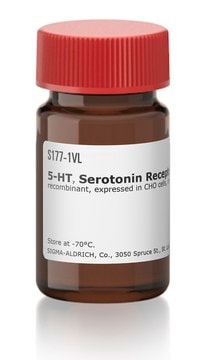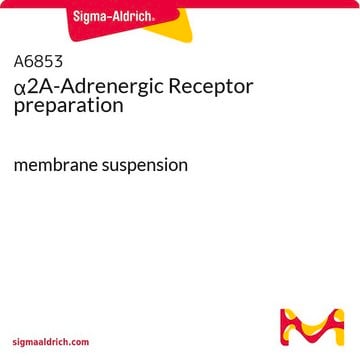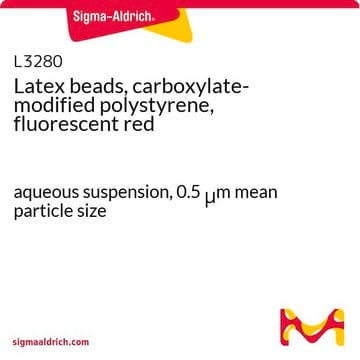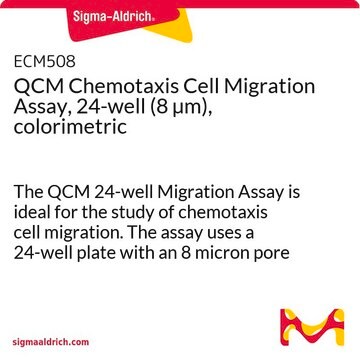HTS110M
ChemiSCREEN Membrane Preparation Recombinant Human 5-HT4B Serotonin Receptor
Human 5-HT4 GPCR membrane preparation for Radioligand binding Assays & GTPγS binding.
Se connecterpour consulter vos tarifs contractuels et ceux de votre entreprise/organisme
About This Item
Code UNSPSC :
41106514
eCl@ss :
32161000
Nomenclature NACRES :
NA.84
Produits recommandés
Source biologique
human
Niveau de qualité
Produit recombinant
expressed in Chem-1 cells
Fabricant/nom de marque
ChemiScreen
Chemicon®
Technique(s)
ligand binding assay: suitable (GTPγS)
radioligand binding assay (RLBA): suitable
Numéro d'accès NCBI
Numéro d'accès UniProt
Conditions d'expédition
dry ice
Description générale
5-Hydroxytryptamine (5-HT, also commonly known as serotonin) is synthesized in enterochromaffin cells in the intestine and in serotonergic nerve terminals. In the periphery, 5-HT mediates gastrointestinal motility, platelet aggregation, and contraction of blood vessels. Many functions of the central nervous system are influenced by 5-HT, including sleep, motor activity, sensory perception, arousal and appetite. A family of 12 GPCRs and one ion channel mediate the biological effects of 5-HT (Hoyer et al., 1994). 5-HT4 comprises at least 8 isoforms varying at the C-terminus, which are generated by alternative splicing. The expression and distribution of these splice variants differs among organs and tissues with many of them present in several tissues such as atrium, brain, and GI tract (Bockaert et al. 2004). To date, all isoforms have been shown to activate adenylyl cyclase in vitro, and no difference in signal transduction between C-terminal 5-HT4 receptor variants has been demonstrated. 5-HT4 receptors are of potential interest for the treatment of patients with GI motility disorders and Alzheimer′s disease (De Maeyer et al. 2008; Lezoualc’h 2007). Millipore′s 5-HT4B membrane preparations are crude membrane preparations made from our proprietary stable recombinant cell lines to ensure high-level of GPCR surface expression; thus, they are ideal HTS tools for screening of agonists and antagonists of 5-HT4B. The membrane preparations exhibit a Kd of 0.46 nM for [3H]-GR113808. With 1 nM [3H]-GR113808, 5 μg/well 5-HT4B Membrane Prep yields greater than 10 fold signal-to-background ratio.
Human HTR4, transcript b, encoding 5-HT4B
Application
Human 5-HT4 GPCR membrane preparation for Radioligand binding Assays & GTPγS binding.
Radioligand binding assay and GTPγS binding.
Actions biochimiques/physiologiques
GPCR Class: A
Protein Target: 5-HT4
Target Sub-Family: Serotonin
Qualité
Table 1. Signal:background and specific binding values obtained in a competition binding assay with varying amounts of 5-HT4B membrane prep.
SPECIFICATIONS: 1 unit = 5 μg membrane preparation
Bmax: 12.5 pmol/mg
Kd: 2.7 nM for [3H]-GR113808
| 10 µg/well | 5 µg/well | |
|---|---|---|
| Signal:Background | 26.4 | 21.7 |
| Specific Binding (cpm) | 5286 | 4879 |
SPECIFICATIONS: 1 unit = 5 μg membrane preparation
Bmax: 12.5 pmol/mg
Kd: 2.7 nM for [3H]-GR113808
Caractéristiques
Inucbation Conditions
RECOMMENDED ASSAY CONDITIONS: Membranes are mixed with radioactive ligand and unlabeled competitor (see Figures 1 and 2 for concentrations tested) in assay buffer in a nonbinding 96-well plate, and incubated for 1-2 h. Prior to filtration, an FC 96-well harvest plate (Millipore cat. # MAHF C1H) is coated with 0.33% polyethyleneimine for 30 min, then washed with assay buffer. Binding reaction is transferred to the filter plate, and washed 3 times (1 mL per well per wash) with assay buffer. The plate is dried and counted.
Assay buffer: 25 mM Tris, pH 7.4, filtered and stored at 4°C
Radioligand: [3H]-GR113808 (Amersham TRK944)
One package contains enough membranes for at least 200 assays (units), where one unit is the amount of membrane that will yield greater than 10-fold signal:background with 3H-labeled GR113808 at 1 nM.
RECOMMENDED ASSAY CONDITIONS: Membranes are mixed with radioactive ligand and unlabeled competitor (see Figures 1 and 2 for concentrations tested) in assay buffer in a nonbinding 96-well plate, and incubated for 1-2 h. Prior to filtration, an FC 96-well harvest plate (Millipore cat. # MAHF C1H) is coated with 0.33% polyethyleneimine for 30 min, then washed with assay buffer. Binding reaction is transferred to the filter plate, and washed 3 times (1 mL per well per wash) with assay buffer. The plate is dried and counted.
Assay buffer: 25 mM Tris, pH 7.4, filtered and stored at 4°C
Radioligand: [3H]-GR113808 (Amersham TRK944)
One package contains enough membranes for at least 200 assays (units), where one unit is the amount of membrane that will yield greater than 10-fold signal:background with 3H-labeled GR113808 at 1 nM.
Forme physique
Liquid in packaging buffer: 50 mM Tris pH 7.4, 10% glycerol and 1% BSA with no preservatives.
Packaging method: Membrane protein was adjusted to the indicated concentration in packaging buffer, rapidly frozen, and stored at -80°C.
Packaging method: Membrane protein was adjusted to the indicated concentration in packaging buffer, rapidly frozen, and stored at -80°C.
Stockage et stabilité
Store at –70°C. Product is stable for at least 6 months from the date of receipt when stored as directed. Do not freeze and thaw.
Informations légales
CHEMICON is a registered trademark of Merck KGaA, Darmstadt, Germany
Clause de non-responsabilité
Ce produit, destiné à la recherche scientifique, est soumis à une réglementation spécifique en France, y compris pour les activités d′importation et d′exportation (Article L 1211-1 alinéa 2 du Code de la Santé Publique). L′acheteur (c′est-à-dire l′utilisateur FINAL) est tenu d′obtenir une autorisation d′importation auprès du ministère français de la recherche, mentionné à l′article L1245-5-1 II du Code de la Santé Publique. En commandant ce produit, vous confirmez détenir l′autorisation d′importation requise.
Code de la classe de stockage
12 - Non Combustible Liquids
Classe de danger pour l'eau (WGK)
WGK 2
Point d'éclair (°F)
Not applicable
Point d'éclair (°C)
Not applicable
Certificats d'analyse (COA)
Recherchez un Certificats d'analyse (COA) en saisissant le numéro de lot du produit. Les numéros de lot figurent sur l'étiquette du produit après les mots "Lot" ou "Batch".
Déjà en possession de ce produit ?
Retrouvez la documentation relative aux produits que vous avez récemment achetés dans la Bibliothèque de documents.
Christophe Rochais et al.
Journal of medicinal chemistry, 58(7), 3172-3187 (2015-03-21)
In this work, we describe the synthesis and in vitro evaluation of a novel series of multitarget-directed ligands (MTDL) displaying both nanomolar dual-binding site (DBS) acetylcholinesterase inhibitory effects and partial 5-HT4R agonist activity, among which donecopride was selected for further
Notre équipe de scientifiques dispose d'une expérience dans tous les secteurs de la recherche, notamment en sciences de la vie, science des matériaux, synthèse chimique, chromatographie, analyse et dans de nombreux autres domaines..
Contacter notre Service technique








